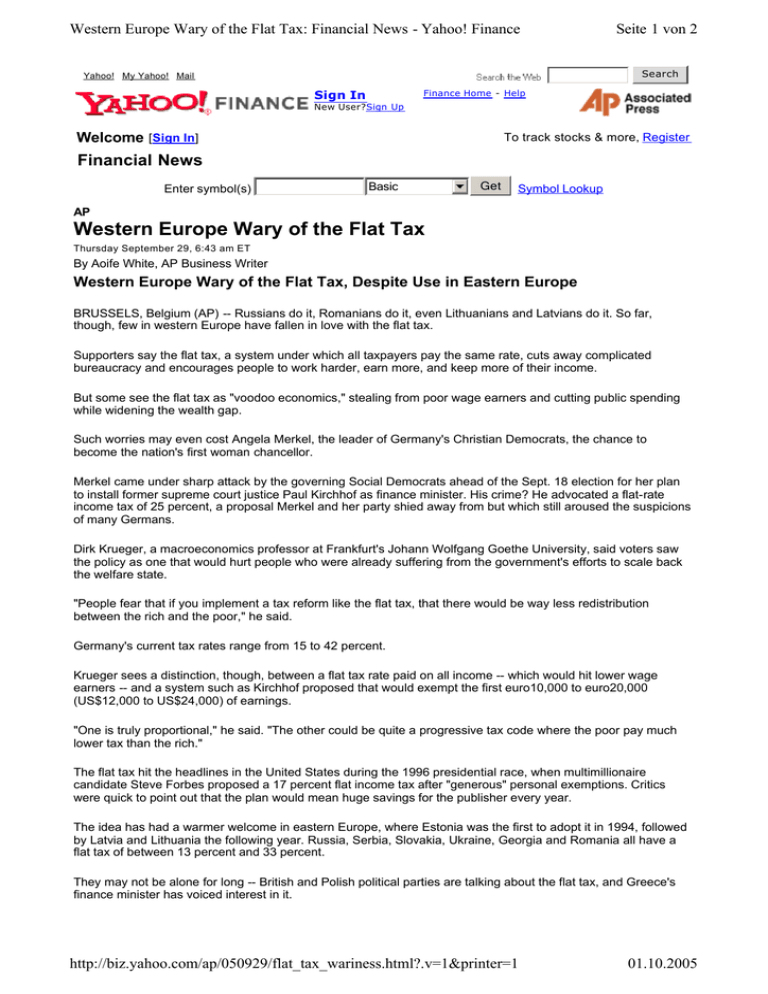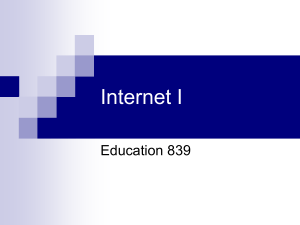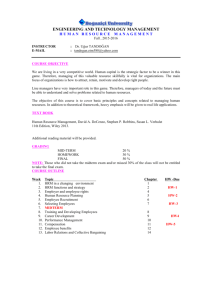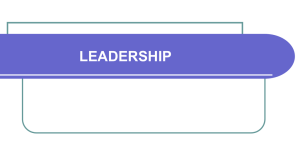
Western Europe Wary of the Flat Tax: Financial News - Yahoo! Finance
Seite 1 von 2
Search
Yahoo! My Yahoo! Mail
Sign In
Finance Home - Help
New User?Sign Up
Welcome [Sign In]
To track stocks & more, Register
Financial News
Enter symbol(s)
Basic
Get
Symbol Lookup
AP
Western Europe Wary of the Flat Tax
Thursday September 29, 6:43 am ET
By Aoife White, AP Business Writer
Western Europe Wary of the Flat Tax, Despite Use in Eastern Europe
BRUSSELS, Belgium (AP) -- Russians do it, Romanians do it, even Lithuanians and Latvians do it. So far,
though, few in western Europe have fallen in love with the flat tax.
Supporters say the flat tax, a system under which all taxpayers pay the same rate, cuts away complicated
bureaucracy and encourages people to work harder, earn more, and keep more of their income.
But some see the flat tax as "voodoo economics," stealing from poor wage earners and cutting public spending
while widening the wealth gap.
Such worries may even cost Angela Merkel, the leader of Germany's Christian Democrats, the chance to
become the nation's first woman chancellor.
Merkel came under sharp attack by the governing Social Democrats ahead of the Sept. 18 election for her plan
to install former supreme court justice Paul Kirchhof as finance minister. His crime? He advocated a flat-rate
income tax of 25 percent, a proposal Merkel and her party shied away from but which still aroused the suspicions
of many Germans.
Dirk Krueger, a macroeconomics professor at Frankfurt's Johann Wolfgang Goethe University, said voters saw
the policy as one that would hurt people who were already suffering from the government's efforts to scale back
the welfare state.
"People fear that if you implement a tax reform like the flat tax, that there would be way less redistribution
between the rich and the poor," he said.
Germany's current tax rates range from 15 to 42 percent.
Krueger sees a distinction, though, between a flat tax rate paid on all income -- which would hit lower wage
earners -- and a system such as Kirchhof proposed that would exempt the first euro10,000 to euro20,000
(US$12,000 to US$24,000) of earnings.
"One is truly proportional," he said. "The other could be quite a progressive tax code where the poor pay much
lower tax than the rich."
The flat tax hit the headlines in the United States during the 1996 presidential race, when multimillionaire
candidate Steve Forbes proposed a 17 percent flat income tax after "generous" personal exemptions. Critics
were quick to point out that the plan would mean huge savings for the publisher every year.
The idea has had a warmer welcome in eastern Europe, where Estonia was the first to adopt it in 1994, followed
by Latvia and Lithuania the following year. Russia, Serbia, Slovakia, Ukraine, Georgia and Romania all have a
flat tax of between 13 percent and 33 percent.
They may not be alone for long -- British and Polish political parties are talking about the flat tax, and Greece's
finance minister has voiced interest in it.
http://biz.yahoo.com/ap/050929/flat_tax_wariness.html?.v=1&printer=1
01.10.2005
Western Europe Wary of the Flat Tax: Financial News - Yahoo! Finance
Seite 2 von 2
Eamon Butler, director of the Adam Smith Institute in London, which supports free-market policies, said eastern
European countries are proof that the flat tax actually increases government revenue because "it changes
behavior" -- giving incentives to generate wealth.
But Nick Pearce, director of the Institute of Public Policy Research in London, rejects that. He said proof that the
flat tax forced people to change how they work simply doesn't exist in Russia, where it was introduced in 2001.
"All the claims that are being made are the same voodoo economics claims that were made in the mid -1980s,"
he said.
Slovakia is often cited as another flat tax success story, after it attracted major foreign investments from
companies such as carmakers PSA Peugeot Citroen and Kia Motors Corp.
But President Ivan Gasparovic told lawmakers in June that investors were won over by cheap labor costs rather
than the 19 percent flat rate tax for businesses and wage earners.
Butler, though, said finance ministers in countries that use the flat tax can point to clear benefits. "When you
actually look at the countries who are doing it, they all say they are indeed getting more money into the treasury,"
he said.
Reducing tax avoidance was one of the reasons behind Romania's introduction of the flat tax earlier this year.
The government replaced its corporate tax of 25 percent and individual income taxes of up to 40 percent with a
flat rate of 16 percent. The reform was meant to help bring to the surface the country's massive underground,
untaxed economy, which is estimated to be worth as much as half of the official economy.
However, Krueger says it is difficult to make a comparison between these former Communist countries and
western European nations.
"Once you have a status quo with a very strong redistributive tax policy it is very hard to convince people to
switch because people get hurt during the transition," he said. "Why that was not the case in the eastern Europe
countries may have something to do with the fact that they more or less started with a blank slate."
Butler's institute has made forecasts for the British economy, showing that the Treasury would take in less money
in the first two years of the plan before the flat tax would stimulate the economy and ultimately boost government
revenues.
That analysis was based on a single flat rate of 22 percent levied on all income above 12,000 pounds
(euro17,700; US$21,200). British taxpayers currently pay tax at rates of from 10 percent to 40 percent.
"In the long run, the Treasury would end up coining more money and more of that would come from the rich than
the poor," Butler said.
Pearce is adamant that would not be the case. He said introducing a 20 percent flat tax in Britain with a high
personal allowance would leave a 50 billion pound (euro74 billion; US$88 billion) hole in the Treasury.
"By definition, a flat tax means that the rich pay less," he said.
Copyright © 2005 Yahoo! Inc. All rights reserved. Privacy Policy - Terms of Service - Copyright Policy - Ad Feedback
Copyright © 2005 The Associated Press. All rights reserved. The information contained in the AP News report may not be published, broadcast,
rewritten, or redistributed without the prior written authority of The Associated Press.
http://biz.yahoo.com/ap/050929/flat_tax_wariness.html?.v=1&printer=1
01.10.2005





